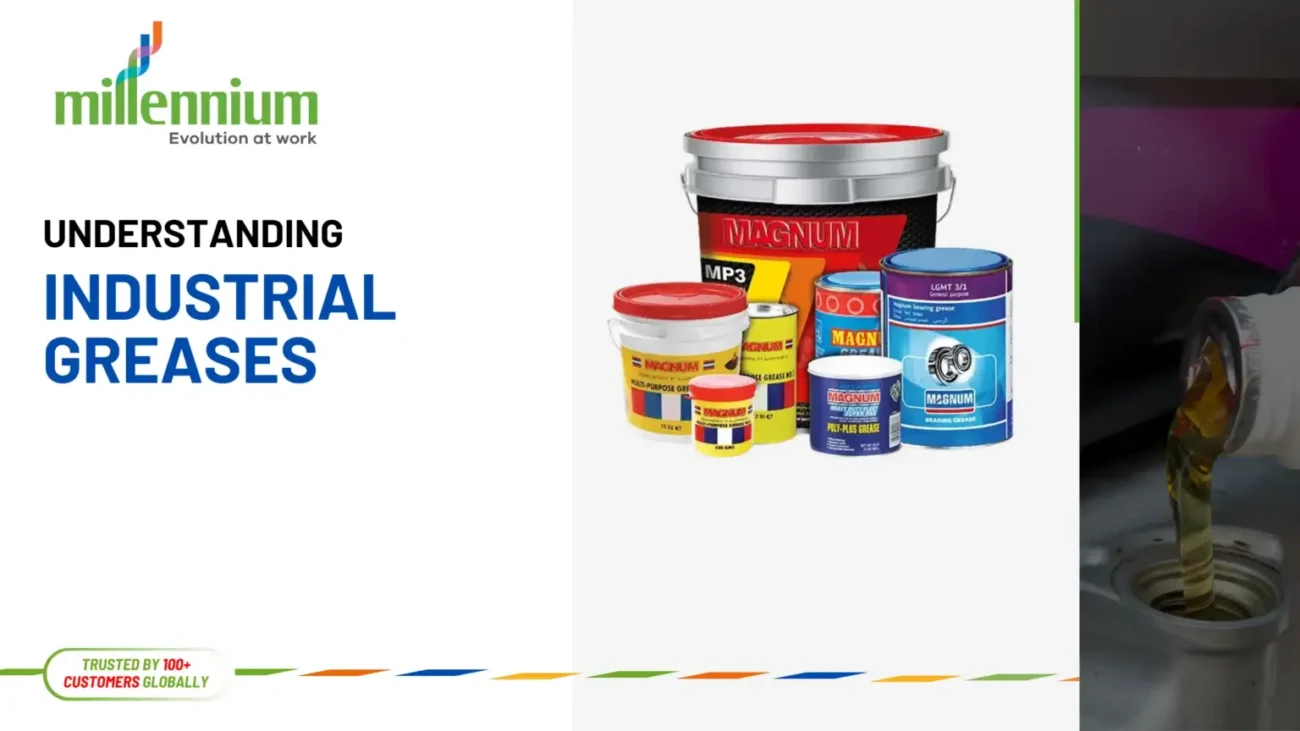Industrial greases are essential lubricants widely used across industries to ensure machinery reliability, reduce wear, and extend equipment life. Unlike oils that freely flow, greases stay in place, providing protection under severe operating conditions. To properly use industrial grease applications, one must understand its composition, types, and application methods, as well as the maintenance practices that maximize performance.
What is Industrial Grease?
Industrial grease is a semi-solid lubricant formulated to reduce friction and wear between moving surfaces. It consists of a base oil, a thickener, and additives that give it special performance properties. Because grease maintains its consistency under heavy loads and harsh conditions, it is commonly used in bearings, gears, couplings, and other components where conventional oils might leak or fail to stay in position.
Composition and Properties of Grease
Grease is primarily composed of three key elements:
- Base Oil – The foundation of grease, usually mineral or synthetic oil, determines properties such as viscosity and lubrication ability.
- Thickener – Acts like a sponge, holding the oil in place. Common thickeners include lithium, calcium, and polyurea.
- Additives – Enhance performance by offering oxidation resistance, corrosion protection, extreme pressure (EP) resistance, and anti-wear properties.
The unique semi-solid structure allows grease to stay in contact with surfaces, provide sealing against contaminants, and offer long-lasting lubrication.
How Grease Functions in Industrial Applications
Grease works by slowly releasing oil from its thickened structure to lubricate surfaces over time. When machinery is in motion, pressure and heat help the grease flow into microscopic gaps, forming a protective film that reduces metal-to-metal contact. In addition, grease provides:
- Sealing action – Prevents entry of dust, dirt, and water.
- Cushioning – Dampens vibrations and shock loads.
- Retention – Stays in place where oil would normally drain away.
This makes grease indispensable in applications where relubrication is infrequent or where liquid lubricants are impractical.
Types of Industrial Greases
High-Temperature Grease
Designed to withstand extreme heat, high-temperature greases are formulated with synthetic base oils and special thickeners such as polyurea or complex soaps. They are used in electric motors, ovens, furnaces, and equipment operating at continuous high temperatures. These greases resist oxidation and maintain lubrication even when exposed to heat above 200°C.
Water-Resistant Grease
As the name suggests, water-resistant greases prevent washout in wet or humid environments. They often contain calcium sulfonate or aluminum complex thickeners, which ensure that the grease adheres to surfaces despite water spray or full immersion. Applications include marine equipment, wastewater treatment facilities, and outdoor machinery exposed to rain or flooding.
Heavy-Duty Grease
Heavy-duty grease are formulated with extreme-pressure additives and high-viscosity oils to handle shock loads and high pressures. They are used in mining, construction, and heavy manufacturing where equipment is subject to intense mechanical stress. This grease reduces wear and provides long-lasting protection under boundary lubrication conditions.
Choosing the Right Grease for Your Machinery
Selecting the right grease is not a one-size-fits-all decision. Factors to consider include:
- Operating Temperature – Ensure the grease can withstand both the minimum and maximum temperatures of the application.
- Load and Speed – High-speed bearings require lighter grease, while slow-moving, heavily loaded parts need higher viscosity greases.
- Environmental Conditions – Exposure to water, dust, chemicals, or extreme weather determines the type of grease needed.
- Compatibility – Mixing incompatible greases can cause separation or performance failure. Always check compatibility before switching brands or types.
Choosing correctly ensures that machinery runs smoothly, reducing downtime and maintenance costs.
Application-Specific Greases
- Automotive Grease – Used in wheel bearings, chassis points, and universal joints.
- Food-Grade Grease – Specially formulated with non-toxic ingredients for use in food processing equipment.
- Marine Grease – Protects against saltwater corrosion and washout.
- Electrical Motor Grease – Low-noise, high-temperature greases designed to ensure motor efficiency.
These specialized greases highlight how formulations are tailored to meet exacting industry requirements.
Temperature Considerations
Temperature is a critical factor in grease performance:
- Low Temperatures – Grease must remain pumpable and provide lubrication without hardening. Synthetic oils are often preferred.
- High Temperatures – Grease must resist oxidation and prevent oil separation. High-temperature thickeners and synthetic base oils are essential.
- Temperature Fluctuations – Wide swings require multi-purpose greases that maintain stability across varying conditions.
Using the wrong grease for a temperature range can lead to hardened or melted grease, bearing failure, and costly downtime.
Maintenance and Best Practices for Industrial Grease Use
To maximize equipment performance and grease lifespan, follow these best practices:
- Right Amount – Over-greasing causes heat buildup and bearing damage, while under-greasing leads to wear. Follow manufacturer recommendations.
- Relubrication Intervals – Schedule lubrication based on load, speed, and environmental conditions. Critical equipment may need continuous or automated greasing systems.
- Clean Application – Use clean tools and avoid introducing contaminants during greasing.
- Storage and Handling – Store grease in sealed containers, away from dust and moisture. Rotate stock to ensure freshness.
- Condition Monitoring – Check grease condition through sampling and monitoring to detect hardening, contamination, or oil separation.
By implementing disciplined lubrication management, industries can significantly extend the life of their assets.
Final Thoughts
Industrial greases are more than just lubricants—they are key contributors to reliability, performance, and efficiency. From high-temperature bearings to water-exposed machinery, the right grease ensures smooth operation, reduces maintenance costs, and protects equipment from premature failure. With proper selection, application, and maintenance, grease transforms from a consumable into a long-term investment in industrial success.
